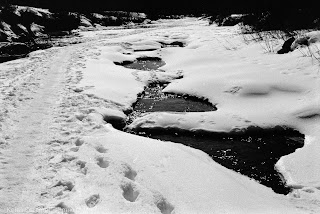I saw this in the new book section of the library, and it came home with me after a very short look over.
Stolen Focus Why You Can't Pay Attention - and How to Think Deeply Again by Johann Hari.
First things first. Put this book on hold at the library, and read it at your first opportunity. Yes, stop reading my blog now, and do that. I know perfectly well you aren't going to read my whole blog in one go, so you might as well make your first interruption a useful one.
Why? It's brilliant. It explains clearly what's being done to you and your children, and it isn't an accident. It's well written, doesn't preach, recognizes it's a complicated problem, and presents some of the alternative viewpoints. There are more than 50 pages of followup links, notes, and index. It's right up to date, quoting current research.
He dives into why you can't get anything done at work. Why you're constantly feeling anxious. With examples, and what the consequences are. He connected a bunch of dots for me.
It's not a problem with you, particularly. It isn't a moral weakness. It isn't a lack of willpower. It isn't your genetic code. It isn't that your parents are failures, in many ways they're victims too.
It's that we are being fed information far faster than we can process it. In self defence we try to simplify, try to flit from one thing to the next. We don't get time to focus on anything. We try to deal with that last email, then do a quick look at Facebook which turns into a doom-scroll, then we can't get to sleep, and need a coffee and sugar injection to get going in the morning, leading to an inevitable crash shortly after, followed by a day of constant interruptions. Repeat, again and again.
The people who built the social media monster quickly figured out how to hook us in, and push the buttons in our brain to keep us hooked in. The little hit from the likes, the comments, the never ending scroll, showing you the negative posts that induce rage and anger, the notification bell, and lots more. The longer you scroll, the more ads you see, and the more money the platform makes.
What did children do before social media, before TV, and excepting the times they were forced into child labor by rapacious business owners? They played. They found other children to play with and they made up games. Even as they got older there was still time for play, between learning about the world by helping adults.
Play is essential to learning. Play sparks creativity. Play helps kids learn to get along. Play helps them find out what they're good at, gives them a chance practice it when the stakes are small, and they can learn from failure when their job isn't on the line. Play lets them learn to figure out how to solve problems.
Children don't play now as much as they should. There's no time. Parents are afraid to let their children out of their sight outdoors. It doesn't matter that we live in the safest society ever. They want children doing structured things so they can get into a good school. They want efficiency, a schedule, a plan, a map. They want kids to be quiet, pacified by the TV or computer. That children want to run and play and be active is now considered a disease to be drugged.
As the twig is bent, the branch will grow. We wonder why more kids than ever before are diagnosed with ADHD. Our solution is to drug them, rather than prevent the problem in the first place. Don't get me started on the whole mindset that drugs are the solution to any problem. Yes, he talks about the role nutrition has.
When was the last time you were in the groove? In the flow, completely absorbed by what you were doing? So absorbed that suddenly it was several hours later. Reading is a good example. I used to dive into a book, and I was gone. That doesn't happen much any more. Linda can still do it. Writing it sometimes happens for me. Doing this blog, for instance. I didn't sleep well last night, and some of it was mentally writing this. I got up, did my morning puzzle games and browed the usual tabs. Logged into and out of Facebook. Started writing. Resisted the temptation to look at anything else. Not totally in the groove, but working on it.
Odds are it's been a while since you were in the flow. Our world is set up to prevent that from happening, which is odd, on one sense. Most people find their work is constantly interrupted. Every few minutes something breaks your chain of thought. An email, an urgent text, a co-worker asking a stupid question, a boss summoning you to a waste of time meeting, the list never ends. Every time you switch tasks, there's an energy cost and time spent getting back into the first task while thinking about the impending deadline that's getting closer. No wonder people feel drained at the end of the day.
I would tell my boss that they were hiring me for specific expertise related to data integrity, and that me staring at a whiteboard and scribbling little squares and arrows was exactly what they were paying me to do, and to not disturb me unless the building was on fire. That every time someone broke my concentration, it would cost an hour to get back to where I was because I was holding a bunch of things in my head, with the relationships between them, and considering subsets and query efficiency. I promised to explain it to them in detail while I got back into it. Usually just the high level job statement made their eyeballs spin. In one job I had a boss that simply couldn't let me work. It was enraging. Eventually I started being a jerk and pushing back. Things got kind of tense for a while. The reason I got away with it is because I was better at my job (and probably at his job, now that I think of it) than he was at his, but more importantly, he needed his job and I did not.
You'd think that corporations would want to provide an environment where their staff could work productively. But no. They make us work in noisy bullpens so we can "collaborate" and "team work", and blah blah blah. They expect instant replies to emails. I hated it. I was fortunate that I never had a corporate cell phone I was expected to answer after hours. They feel it's more important to have a compliant and obedient workforce, than a productive one. Why? Because productive means thinking, and then you might be thinking unauthorized thoughts, which might lead to change that might undermine the people currently in charge or how they do things. Don't get me started on accountants showing it's cheaper to crowd more people onto a floor by removing offices.
In a denial of service attack, a group of computers gang up on another and bombard it with requests until it is overwhelmed and can't respond to the intended users. That's what social media does to you. It bombards you with trivia in a never ending stream. Celebrity gossip, sports scores, advertising, news snippets devoid of actual context, emails, texts, all manner of social media sending you notifications of watch me watch me! We start obsessively checking our devices for updates.
When was the last time you went for a walk without your cell phone? The last time you had an actual face to face conversation with someone and neither of you pulled out your phone? The last time you did something from start to finish without pausing to check for text or email? The last time you didn't answer your phone when it rang?
We stopped answering our land line because there were so many robo-calls. It took us a while, because we've been conditioned to jump to the phone when it rings. Now we only pick up if we're expecting a call, or the person starts to leave a message, and we want to talk to them. One of my favourite lines is "It's worth the small fee each month to have a phone number I can give to people I don't want to talk to." My look clearly indicates they are on that list. Even my cell phone, I might not pick up. I liked the setting where it doesn't even ring unless the number is in your contacts list.
Which reminds me. When I retired I went through my LinkedIn contact list and was astonished at how many of them were dead. I deleted them and a bunch of other people, probably cutting my list in half. I'm discussing with myself if I even need it anymore. I went through Facebook and trimmed the 'friends' list of dead people and people I no longer share interests with. People grow and change. I should probably look at my personal contacts list in my phone; I know for a fact there are dead people still listed, but that's handy for some things.
You might remember that I bailed out of Facebook for the first part of the month. I'm back, somewhat, though I use it differently now. I actually log out, so that in order to look at it again, I have to log in. I look at the notifications and for messages. I'll look at the top item in my wall, and I won't scroll, because the next item is always an ad and then the click bait videos. I'll look at my groups. I might search for a name and see what they've posted lately. And then I'll log out. I'm trying to look only once a day. I've long since logged out of Instagram and deleted my twitter account.
All of this distracts us from the important stuff, like getting through a pandemic and understanding what to do about the fact that our world is on fire. Our climate is changing. We've done stuff about the climate before, like when we banned CFC's. That took huge concerted action, but now it's much harder to get concerted action because everyone is so distracted, which is the way lots of people in charge like it. Plus it's a big change, and not many corporations see the incentive in leading the change.
There's lots more that I haven't got into. It's a great read, and well worth your time. I got through it in two sessions, though I was constantly telling myself not to check my phone.
I will put the blog notification on Facebook, though I don't know how many people will see it. But it's probably the last time I'll do that. If you would like to be emailed when I blog, so you don't miss any of my brilliant writing or fabulous photos, ask to be added to my blog notification list. Send an email to keith@nucleus.com or text me, or comment on Facebook or the blog.
Now, tell me true. Did you get through the text in one go? Or did you go away oops shiny be right back got to go what was that you were saying
Of the Day
Driftwood (NZ)
Driftwood (BC)
Peony
Flower
Tombstone
Film (new)
Part of the Glenmore Water Treatment Plant.
Film (old)
I don't know what year this is. Probably early 90's, given the beard.










































































